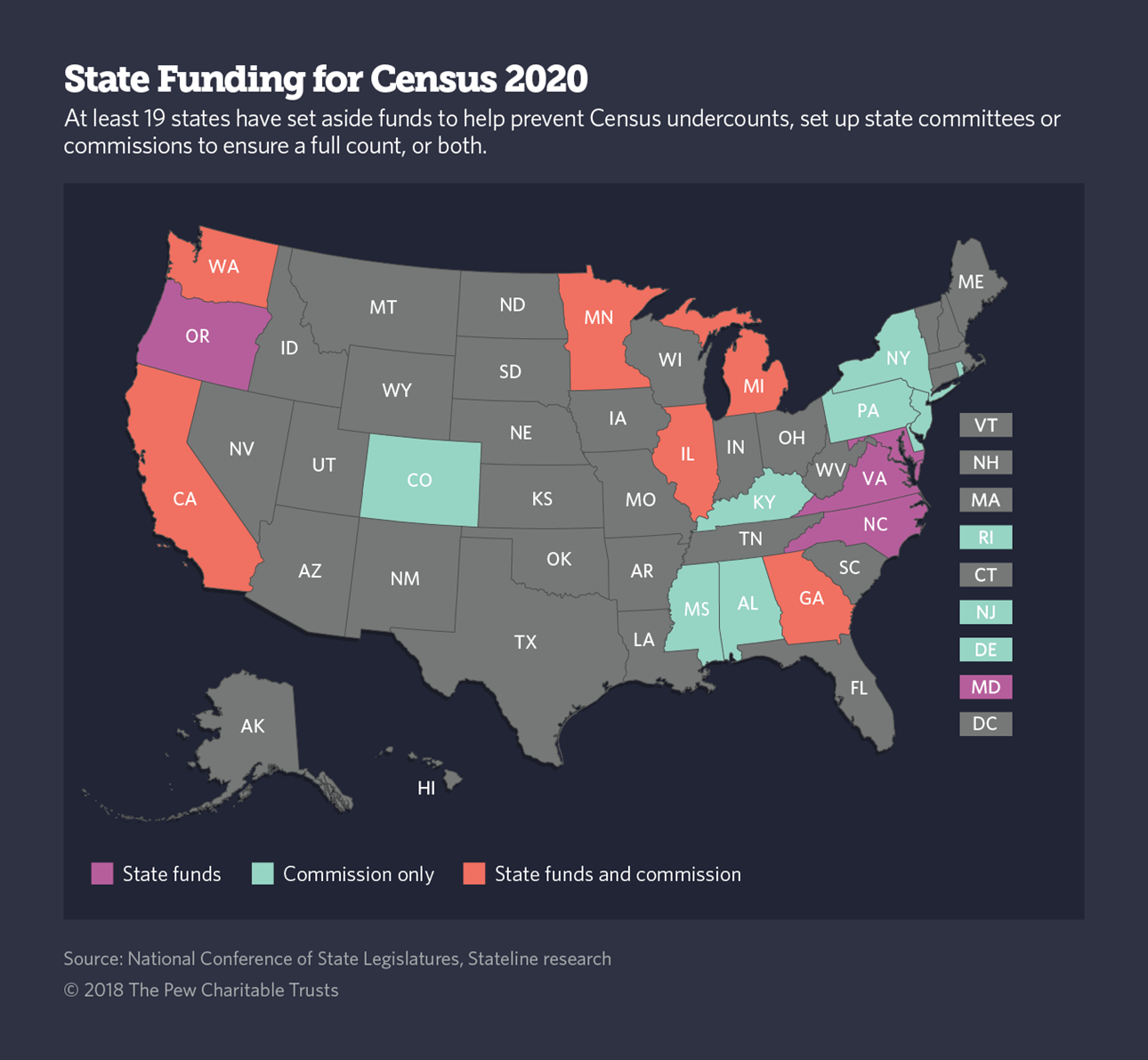High-Immigration States Diverge on Census Citizenship Question

The U.S. Census Bureau website. Shutterstock
In cities and states with big immigrant populations, different opinions about what the Census' citizenship question will mean.
This article was originally published by Stateline, an initiative of The Pew Charitable Trusts.
Arizona, California, Florida and Texas all have large immigrant populations, so if the new citizenship question on the 2020 census dissuades immigrants from participating, the resulting undercount could cost all of them seats in Congress and billions in federal money.
That prospect has helped energize state and local leaders in Democratic-dominated California. That state has pledged to spend $100 million on outreach. It spent only $2 million on the 2010 census, when the state had a severe budget crisis, and $25 million in 2000.
But the situation is far different in Republican-led Arizona, Florida and Texas. There, state leaders support the citizenship question or have declined to fight it, and they have largely left it to city and local officials to organize outreach efforts.
Take Mesa, Arizona, named several years ago as the nation’s most conservative large city. Mesa Mayor John Giles is a Republican, but he was one of 161 mayors who signed a March letter protesting the new citizenship question. He called it “a self-inflicted wound” that will hurt efforts to count people.
The mayors of Phoenix, Tempe and Tucson also signed the letter. But Arizona’s Republican attorney general, Mark Brnovich, rejected an appeal by Democratic state lawmakers to join a lawsuit filed by 17 states to stop the question. No Republican attorneys general joined the suit.
Seventeen Arizona Democrats sponsored a bill that would have directed $2 million to the secretary of state’s office for census communication and outreach, half of which was to be given to each county based on population, and half to each city and town, but it died in committee.
“This can’t be a partisan issue. It’s a common-sense issue,” Giles said. “An undercount in any city is a huge problem. It’s a mistake that can last and be compounded for 10 years in terms of funding and every other important decision.”
In fiscal 2015, the most recent year for which information is available, 132 programs used census data to distribute more than $675 billion in federal money. Medicaid, food stamps, highway construction money and school lunches all depend on the count.

Mesa is about 28 percent Hispanic and about 8 percent of city residents are not citizens. Mesa earlier this month created a task force with 24 members drawn from nonprofits, businesses, hospitals, schools and other “critical segments of the community” to create and oversee an outreach plan.
Other Arizona cities, including Phoenix, Tempe and Yuma, have created similar “complete count” committees.
The Trump administration in December 2017 proposed reinstating the citizenship question for the first time since 1950. In its request, the Justice Department said it wanted more detailed census data to better enforce the Voting Rights Act.
In a March memo, U.S. Secretary of Commerce Wilbur Ross, whose agency oversees the census, said the possibility of depressing the response rate was “an important consideration in the decision-making process.”
He concluded, however, that “the need for accurate citizenship data and the limited burden that the reinstatement of the citizenship question would impose outweigh fears about a potentially lower response rate.”
But from the beginning, critics charged that the administration’s goal was to discourage immigrants from participating.
About 25 million immigrants living in the United States are not citizens. And nearly half of those who are not citizens are undocumented. Opponents of the citizenship question fear that even immigrants who are here legally may balk at participating in the census if they live with relatives or friends who are undocumented.
Emails from the Commerce Department released this summer show officials across the Trump administration pushing for the citizenship question. Critics suggest the administration added the question as part of its broader crackdown on illegal immigration—and perhaps to give an electoral boost to Republicans.
Though noncitizens cannot vote in state and federal elections, they do count as residents in the allotment of congressional seats and the drawing of state legislative districts. Since most immigrants live in large cities that vote Democratic, fewer immigrants translates into smaller populations, and less representation, for those areas in state legislatures and Congress.
The dilemma for Republican leaders in states with large immigrant populations is that a severe undercount could lead to less federal money and—perhaps—fewer overall seats in Congress for their states.
When U.S. Sen. Marco Rubio of Florida was asked what he thought of the citizenship question, the Republican told reporters, “I personally don’t see the problem with it.”
Some of Rubio’s fellow Florida Republicans disagree. U.S. Rep. Ileana Ros-Lehtinen and state Sen. René García, both Republicans representing the Miami area, in May published an op-ed in the South Florida Sun Sentinel warning that the citizenship question will “strip millions of dollars and political power away from the Sunshine State.”
The two lawmakers noted that Hispanics are the majority in Miami-Dade County, and that growth in the Hispanic population recorded by the last census “resulted in real power and real dollars for all Floridians.”
If the new citizenship question depresses response rates among this population, the lawmakers warned, it could cost Florida two additional congressional seats it might otherwise be awarded after the 2020 census.
“Even an additional one percent undercount of Florida’s population could greatly jeopardize the purse strings and power of the nation’s third most populous state,” they wrote.
Broward County, north of Miami, has created its own complete count committee, and beginning this week Florida nonprofits and foundations will be meeting in cities throughout the state to talk about how to maximize participation in the census, according to Geula Ferguson of the Florida Philanthropic Network, a sponsor of the effort.
A similar dynamic is playing out in Texas. Republican U.S. Sen. Ted Cruz was among those who favored the citizenship question, which he has called a “reasonable, commonsense addition to the census.” The state’s attorney general, Ken Paxton, also a Republican, said, “we always are better off having a more accurate count of citizens versus noncitizens. I see no downside in this.”
But Houston officials are worried. The city plans to spend $750,000 on a census publicity campaign, up from $500,000 a decade ago, an increase of 50 percent.
“I don’t expect to get any support from the state,” said Margaret Wallace Brown, Houston’s acting planning director. “We believe that Houston has been undercounted for decades.”
Houston Mayor Sylvester Turner, a Democrat, signed the letter opposing the citizenship question, as did the mayors of Austin, Dallas, San Antonio, Arlington and College Station.
During the 2010 census, Houston officials reached out to community leaders. This time, they will go door to door encouraging residents to participate.
They will focus on those deemed least likely to take part: the thousands of people displaced by recent hurricanes, college students, immigrants and refugees, transplants from other cities, and young apartment dwellers.
“We liken it to a full court press or an election campaign. We’re taking what we did in 2010 and putting that on steroids,” Wallace Brown said. “Millennials don’t answer the phone, they don’t answer the door—how do you get their attention? We’re still working on that.”
Other Texas cities and counties also are taking steps to encourage participation. Austin’s Travis County will hire a full-time director for the count next year, and five counties and 19 cities, including Austin, Dallas and Fort Worth, have created complete count committees.
John Thompson, who headed the Census Bureau from 2013 to 2017, predicted that some states that have shown little enthusiasm for census preparation so far might reconsider as the clock ticks down to the count in April 2020.
“As you get closer and closer to the census, you will see more and more concern being expressed on a bipartisan basis to get the most accurate count that is possible,” Thompson said. “It will become more and more clear how important it is.”
NEXT STORY: A New Approach for Hurricane Recovery Efforts





